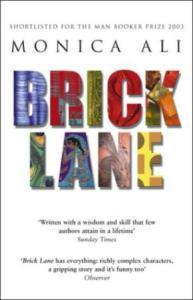
Brick Lane by Monica Ali
Doubleday (hardback), 2003
413 pages
http://authors.simonandschuster.co.uk/Monica-Ali/18854757
http://literature.britishcouncil.org/monica-ali
This is a library book borrowed from The Mitchell Library (http://www.glasgowlife.org.uk/libraries/the-mitchell-library/Pages/home.aspx).
BLURB FROM THE COVER
Nanzeen’s inauspicious entry to the world, an apparent stillbirth on the hard mud floor of a Bangladeshi village hut, imbues in her a sense of fatalism that she carries across continents when she is married off to Chanu. Her life in London’s Tower Hamlets is, on the surface, calm. For years, keeping house and rearing children, she does what is expected of her. Yet Nanzeen walks a tightrope stretched between her daughter’s embarrassment and her husband’s resentments. Chanu calls his eldest daughter the little memsahib. ‘I didn’t ask to be born here’ says Shahana, with regular finality.
Into that fragile peace walks Karim. He sets questions before her, of longing and belonging; he sparks in her a turmoil that reflects the community’s own; he opens her eyes and directs her gaze – but what she sees, in the end, comes as a surprise to them both.
While Nanzeen journeys along her path of self-realisation, a way haunted by her mother’s ghost, her sister Hasina, back in Bangladesh, rushes headlong into her life, first making a ‘love marriage’ then fleeing her violent husband. Woven through the novel, Hasina’s letters from Dhaka recount a world of overwhelming adversity. Shaped – yet ultimately not bound – by their landscapes and memories, both sisters struggle to dream themselves out of the rules prescribed for them.
EXTRACT
AN HOUR AND forty-five minutes before Nanzeen’s life began – began as it would proceed for quite some time, that is to say uncertainly – her mother Rupban felt an iron fist squeeze her belly. Rupban squatted on a low three-legged stool outside the kitchen hut. She was plucking a chicken because Hamid’s cousins had arrived from Jessore and there would be a feast. ‘Cheepy-cheepy, you are old and stringy,’ she said, calling the bird by name as she always did, ‘but I would like to eat you, indigestion or no indigestion. And tomorrow I will have only boiled rice, no parathas’.
REVIEW
I really enjoyed Brick Lane. Ali’s novel reminds me of Small Island by Andrea Levy and other similar novels I’ve read. I have very little knowledge of life for an immigrant or the culture and history of Bangladesh. The most enjoyable aspect of Brick Lane was how Ali took me into a world, culture and history so different from my own. I was fascinated by the experiences of Nanzeen, her sister Hasina and Nanzeen’s husband Chanu and the other immigrants they encounter in London. I thought the characterisation was excellent in Brick Lane. I really cared about what happened to the people Ali created. One of the most moving sections of Brick Lane is what happens to the community in the aftermath of 09/11 when they experience hatred and prejudice. Now and again I like to read something very different, a novel that takes me somewhere I’ve not really explored before. Brick Lane does that. I thought Nanzeen was a great main character. I really sympathised with her and her inner struggles when her affair with Karim really opens her eyes. I thought the ending was great. Ali ends on a happy note without being over-the-top. I really enjoyed reading Hasina’s letters to each other but would have proffered if Ali just used time shifts to show their different lives. I’m not a huge fan of letters or diaries and that sort of thing as a plot device. I would recommend Brick Lane and would read more of Ali’s work. I thought Brick Lane was well-written, engaging and different.
RATING

